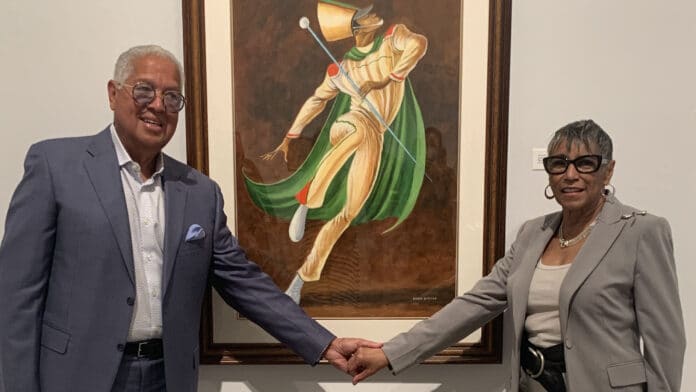Black history told through art and artifacts at powerful exhibition at the Frederick R. Weisman Museum
An exhibition intended to inspire, enrich and educate is now on display at the Frederick R. Weisman Museum at Pepperdine University. “The Cultivators: Highlights from the Kinsey African American Art and History Collection” features breathtaking art and historic memorabilia that helps tell the stories of African American artists, inventors, activists, and others whose accomplishments were mostly untold until now.
“The stories in this exhibition tell of struggle and perseverance, of subjugation and liberation and achievement against all odds,” said Andrea Gyorody, Interim Director of the Weisman Museum. “This is the first major exhibition of Black art and culture at the Weisman, and with the lasting mark I know it will leave, I’m confident it won’t be the last,” Gyorody added.
The unparalleled collection amassed by Bernard and Shirley Kinsey not only showcases art, but also books and artifacts that highlight contributions made by African Americans that were overlooked for sometimes centuries. 80 pieces are on display covering 500 years from slavery to emancipation, to the Civil Rights Movement, and up to the present.
Giving voice to those who are and were suppressed is a Kinsey mission. His motto: “Leave the door open and keep the ladder down” is what Bernard Kinsey did while working his way up the corporate ladder. Called a “groundbreaker” by J. Goosby Smith, Vice President for Community at Pepperdine, Kinsey helped grow Xerox’s diversity from only 121 Black employees in 1971 to over 14,000 in 1991.
Activist and educator Shirley Kinsey lives by her motto: “To whom much is given, much is expected.” Married 55 years, the activist couple has given more than 22-million dollars to scholarships and philanthropic causes.
15 million people have already seen part of the collection that has toured around the world. 10 million alone toured the exhibit at EPCOT in Florida, where it was displayed for five years.
Although the exhibit covers 500 years, “This is not ancient history—fighting to be able to go to a theater—buy a hotdog,” Bernard Kinsey said speaking of the civil rights movement. “What we’re talking about is from our lifetime that we’ve had to deal with.” Kinsey added, “White people and Black people think we should be past this and say ‘What are you still fighting for?’ Because nothing has changed. We don’t want anything from white people. We just want to be able to have the same access.”
The Kinseys say even with their wealth and privilege; they’re still subject to racism. “We still feel it—because of the color of your skin. As Black people in this country, we’re invisibly present. In other words, we’re in the room, but nobody sees us. Nobody understands us; we’re not part of the narrative, not part of the discourse that happens in this country. You see it all the time. You’re not invited to that meeting.”
Although the Kinsey exhibit features a celebrated family friend, Rosa Parks, it also features the little-known story of Elizabeth Jennings, who in 1854 started the integration of New York City streetcars. “These remarkable people did so much and got so little from it,” Bernard Kinsey reflected. Shirley Kinsey stated, “Black history is American history.”
The show’s title “The Cultivators” is taken from a signature painting of the same name bestowed by its creator, Samuel L. Dunson, who artfully depicts the Kinsey family as cultivators of knowledge and culture.
Dr. Goosby observed, “The Kinsey Collection asks, “Who are you in the African diaspora? Where have you been? What have you done, and where can you go?”
More art and artifacts from the Kinsey Collection will be on display at Sofi Stadium in February in time for the Super Bowl. The Weisman exhibit runs through Mar. 27.
On Feb. 19, the Weisman Museum will host a celebration of “The Cultivators” with tours, food trucks, music, and children’s activities. Advanced registration is required at arts.pepperdine.edu/museum or call (310)506-4851. Admission is free.

